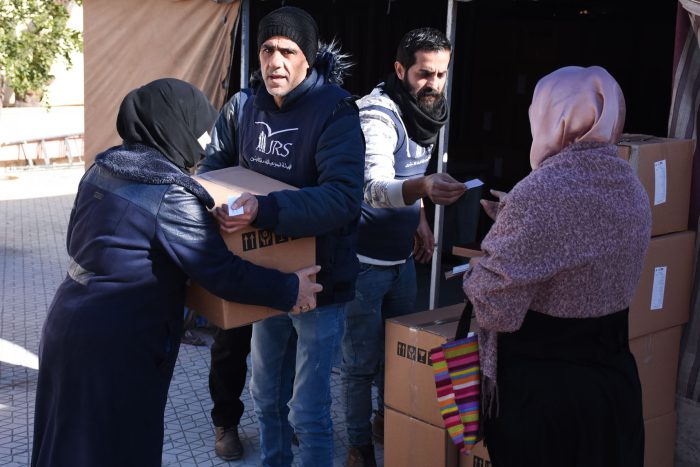Syrian People Deserve the Right to Rebuild Their Lives
15 March 2024
As Syria enters its 13th year of crisis, the humanitarian situation in the country is becoming every day more dire. The ongoing conflict has resulted in over 5 million refugees and more than 6 million internally displaced persons. The destruction wrought by the February 2023 earthquakes and their aftermath caused a sharp increase in humanitarian needs.
Those who survived the earthquakes continue to experience the daily consequences of a long-running civil war. “Since October 2023, the level of air strikes and clashes between opposing armed forces has increased. I think people forget that Syria is a war zone, and that people are dying every day because of military activities and the conflict,” comments Fr. Tony O’Riordan, JRS Syria Country Director.
The level of failure and collapse of the economy, and the inability to distribute basic necessities like shelter, food, healthcare, education, and water, means that people notice the lack and suffer much more. “Considering the current circumstances, the resilience of the population is weakening,” says Roula, JRS Staff from Lebanon.
The crisis in Syria is getting deeper.
 Over the past year, JRS distributed clothes and provided food to 44,000 people. Unfortunately, levels of hunger and malnutrition continued to rise, especially among children. The cost of food has doubled since January and quadrupled in only two years. In the same time, the local currency devalued by over 100%, slashing Syrians’ purchasing power.
Over the past year, JRS distributed clothes and provided food to 44,000 people. Unfortunately, levels of hunger and malnutrition continued to rise, especially among children. The cost of food has doubled since January and quadrupled in only two years. In the same time, the local currency devalued by over 100%, slashing Syrians’ purchasing power.
Rising prices and decreasing income prevent people from making ends meet. Around 90% of the Syrian population lives in poverty. “The Syrian community has changed due to the absence of men who have been conscripted into the army or immigrated. Most of the households are now headed by females and old people, which has resulted in an increase in early marriage cases as well as child labor, therefore, education and healthcare have become luxuries they can’t afford,” Rima, JRS staff from Syria. There are more than 2 million children out of education because they work to help their families survive.
Funding cuts to humanitarian organizations are making it difficult to sustain life-saving operations in Syria. As a result, JRS’s healthcare programs are at risk. It is increasingly hard to ensure access to everything, from the daily medications that treat both common and chronic diseases like diabetes to basic surgeries needed to save lives.
The world must not forget Syria.
According to Fr. O’Riordan, 2024 will probably be the most difficult year for the Syrian population, certainly since 2017. “We refuse to merely endure this devastation. What we crave is not just aid, but a fundamental change in the political situation. Which leads to justice, dignity, and freedom. We ache for the opportunity to rebuild what has been shattered. Our homes, our communities, our lost generation,” Wael, JRS staff from Syria.
Last year, the international community mobilized over $6 billion for Syria at the 7th Brussels conference, the biggest annual pledging event for Syria. The 8th Brussels Conference supporting Syria and the region, which will take place on April 30th in the European Parliament in Brussels, followed by a Ministerial Segment on May 27th in the EU Council, presents a critical opportunity to take action.
As the biggest donor for the Syrian people, the EU cannot let Syrians’ dire situation fall off the agenda. The EU must ensure that solutions for the Syrian people remain as urgent for Europe and the international community as they are on the ground.
JRS calls on donors at the Brussels Conference to prioritize humanitarian and long-term development funding that will support the critical needs of Syrians affected by the conflict. This includes funding for health, education, and emergency support. JRS also calls on the international community to work towards an overall and comprehensive political solution to the conflict so Syrian people can live in justice and peace.




